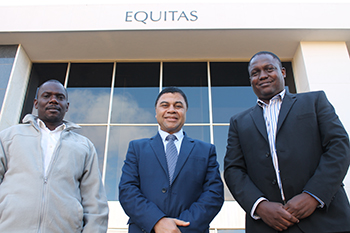Latest News Archive
Please select Category, Year, and then Month to display items
30 October 2018
|
Story Rulanzen Martin
|
Photo Peet van Aardt
 Some of the student writers who contributed to the anthology that tells their stories in Sesotho, isiXhosa, isiZulu, English and Afrikaans.
Some of the student writers who contributed to the anthology that tells their stories in Sesotho, isiXhosa, isiZulu, English and Afrikaans.
How do you transform the higher education curriculum? You involve the exact people the curriculum is intended for. The book, Initiative for Creative African Narratives (iCAN,) illustrates how decolonisation can be achieved through literature for students by students.
iCAN is an initiative by the Centre for Teaching and Learning (CTL) at the University of the Free State (UFS) to mentor students in creative and narrative writing. Under the mentorship of Dr Peet van Aardt, project coordinator, and Ace Moloi, author and UFS alumnus, iCAN Volume 1 was recently launched with 47 short stories written by UFS students.
“The project is a response from the centre for the ever-increasing need for decolonised curricula, steeped in the local cultural perspective of ubuntu,” said Dr Van Aardt.
“This book is an example for how decolonisation can be implemented,” said Prof Francois Stydrom, Senior Director of CTL. The overall aim of the iCAN project is to have the content that materialised from it to be included in the curriculum of first-year students at UFS in the near future.
Book provides multiple voices
Starting in May 2018, CTL presented a series of creative writing workshops on all three of the UFS campuses. “It’s a medium that allows a diverse range of students to express their views and develop their voices as writers,” said Prof Strydom.
It is a form of empowerment, to pass the baton to students to improve the UFS curriculum by writing and publishing their own stories, thereby contributing to larger bodies of knowledge through their lived experiences.
“I believe we as a university need to enable students so that they move away from just being users to becoming contributors to the curriculum,” Dr van Aardt concluded.
UFS hosts YSI for first conference of its kind in Africa
2017-06-13

From the left: Bryson Nkhoma, a doctoral student from
the International Studies Group, Prof Francis Petersen,
Rector and Vice-Chancellor of the UFS, and
Dr Tinashe Nyamunda, a postdoctoral fellow from the
International Studies Group.
Photo: Siobhan Canavan
In the first conference of its kind on the African continent, the University of the Free State’s Bloemfontein Campus was privileged to host the Young Scholars Initiative (YSI) conference.
Reflecting on the African experience
A total of 65 young and senior scholars from five continents attended the conference Decolonising Africa? The Economic History of Development, hosted by the YSI in partnership with the International Studies Group at the UFS.
The conference, held on 8 and 9 June 2017, provided an opportunity to reflect on the African experience from an historical perspective and to assess the current position of the continent in the global economy. It discussed new themes in development, such as the role of women, minorities and entrepreneurs.
The conference focused on how the business community has operated in an Africa that still faces inequalities and unfair terms of trade and lacks a unified political will.
Keynote speakers at conference
Prof Francis Petersen, Rector and Vice-Chancellor of the UFS, said decolonisation was not self-explanatory. “In its radical form, decolonisation presents two polar opposites. On the one side is white privilege and on the other is black pain.”
Prof Ian Phimister, Senior Research Professor at the Centre for Africa Studies at the UFS presented the opening keynote address entitled International Imperialism: The Violent Making of Southern Africa, 1884-1914.
Other keynote speakers included Prof Sabelo Ndlovu Gatsheni from the University of Pretoria, Prof Gareth Austin from the University of Cambridge, and the closing keynote by Prof Alois Mlambo from the University of Pretoria.